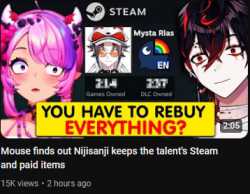>>75209094Hey everyone,
I've noticed a lot of discussion about Nijisanji's practice of not allowing their VTubers to take possession of their YouTube play buttons, which are awarded upon reaching 100,000 subscribers (Silver) and other milestones like 1,000,000 subscribers (Gold). I wanted to offer some perspective on why this practice makes sense for a company like Nijisanji.
1. Company-Owned Channels:
Nijisanji owns the YouTube channels on which their VTubers stream and build their fanbases. These channels are not personal properties of the individual VTubers, but assets owned by the company. This ownership structure is common in many entertainment industries where companies invest in talent and infrastructure.
2. Recognition of Company Efforts:
The YouTube play buttons are awarded to channels, not individuals. When a Nijisanji VTuber reaches a subscriber milestone, it's not just the individual talent that contributed to that success, but also the company's marketing, management, support staff, and other resources. By retaining the play buttons, Nijisanji acknowledges the collective effort behind the channel's growth.
3. Continuity and Legacy:
Nijisanji aims to maintain a consistent and coherent brand identity across its VTuber roster. If a VTuber leaves the company, the play button serves as part of Nijisanji's legacy and can be used to inspire future talent. It also helps maintain continuity for the company, especially when new VTubers take over established channels.
4. Contractual Agreements:
VTubers who join Nijisanji agree to certain terms and conditions, which likely include the understanding that the channels they work on are company property. This means that any awards or recognition associated with those channels belong to Nijisanji, not the individual VTubers. It's not unlike a musician not being able to take their gold records with them when they leave a record label.
5. Protecting the Brand:
By retaining the play buttons, Nijisanji ensures that these symbols of achievement stay within the company's control. This protects the brand from potential misuse or misrepresentation if a former VTuber decides to use their play button for unrelated or competitive purposes.
While it might be disappointing for individual VTubers to not have physical possession of their play buttons, it's important to remember that these are company assets. Nijisanji's practice of keeping them is not only consistent with business norms but also aligns with the company's need to protect its brand and recognize collective effort.
Thanks for reading! I hope this helps clarify Nijisanji's approach to managing YouTube play buttons. Feel free to share your thoughts or ask questions. Let's keep the conversation respectful and open to different views.

